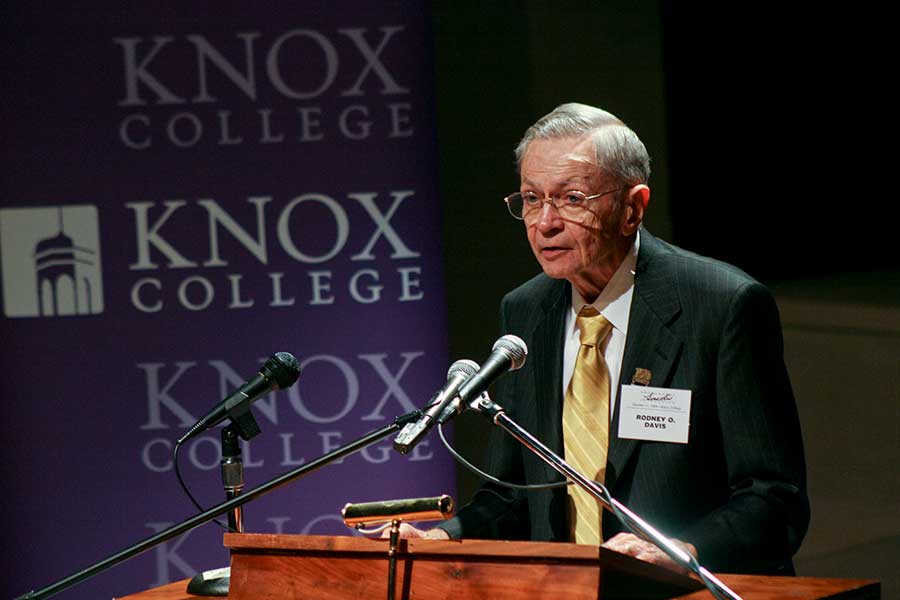

Knox Scholars Provided Historical Details to Lincoln Vampire Film
Producers were interested in political rallies of Lincoln's day
Rodney Davis speaks to the Abraham Lincoln Colloquium, held at Knox in 2008
Say what you want about the new film "Abraham Lincoln: Vampire Hunter" -- pre-release comments range from "great director, great writer, based on a great book" to "the film industry is really running out of ideas... it looks pretty stupid" --you have to give the producers credit for seeking out the nation's leading Lincoln scholars for historical detail.
"They were in touch with us briefly," said Rodney Davis, co-director with Douglas Wilson, of the Lincoln Studies Center at Knox College.
"The producers wanted to know about political rallies," Davis said this week, days ahead of the release of the film by 20th Century Fox on June 22. Researchers contacted the Lincoln Studies Center in February 2011, asking about the kinds of floats that would have appeared in 19th-century political parades, what kinds of banners people would have carried, Davis said.
Boisterous political rallies and parades accompanied the Lincoln-Douglas debates that took place at Knox College and six other locations around Illinois in 1858, which Davis and Wilson discuss in their book, The Lincoln Douglas Debates: The Lincoln Studies Center Edition, and a podcast series, The Real Issue, The Real Debates.
- Rodney Davis discusses the typical crowd atmosphere at a debate -- excerpted from the Jonesboro debate podcast in the series The Real Issue, The Real Debates
"We did not spend a lot of time with them," Davis said of their contact with the film company. Aside from the fantasy plot -- vampires killed Lincoln's mother and planned to take over the nation -- Davis credited the producers for their interest in details: "It sounded like they were striving for some degree of historical accuracy."
Lincoln, the Ax Man
The film's imagery, shown in previews, portrays Lincoln as an ax-wielding warrior. The ax part, at least, is accurate. From his farm-boy background to the 1860 "Rail Splitter" campaign slogan, Davis said, Lincoln was intimately familiar with the ax.
"In an autobiographical sketch, Lincoln said that as a boy he 'was almost constantly handling that most useful instrument'," Davis said.
But Lincoln also rejected the lifestyle represented by the ax -- and all other farm implements. "He didn't want to be a farmer," Davis said. "He wanted out of that."
Lincoln, the Fighter
Previews of the film show Lincoln fighting with vampires. As with the ax imagery, the record of Lincoln as a combatant is extensive. "There are reports of Lincoln fighting as a young man, when he lived in Indiana," Davis said. "He didn't look for trouble, but he wasn't going to run from it."
The most famous episode is Lincoln's 1831 wrestling match with Jack Armstrong in New Salem, Illinois -- examined in detail in the entire first chapter of Honor's Voice, the award winning book by Douglas Wilson, Davis's colleague at Knox.
Wrestling on the 19th-century American frontier was not fighting, Wilson writes. It was more "a test of strength and skill," where opponents grappled, and the object was to throw the opponent off balance.
While accounts of the match vary, Wilson writes, most agree that Armstrong "broke his hold" and won the match. Although Armstrong's move was apparently a violation of the unwritten rules, Lincoln accepted the loss.
"Everyone present, including Lincoln, understood that the match was a rite of passage; that as a newcomer Lincoln was being tested to see what he was made of," Wilson writes. "What [the witnesses] remembered was not so much Armstrong's behavior as Lincoln's. He had proved himself by managing to keep his composure and to handle the situation in such a way that he and Armstrong emerged not as enemies but as real friends."
Lincoln, the Anti-Slavery Leader
At the core of the film, and the book on which it was based, is the fantasy plot, described in the publicity blurb: "President Lincoln's mother is killed by a supernatural creature, which fuels his passion to crush vampires and their slave-owning helpers." Seth Grahame-Smith, author of the book on which the film is based, described it as "a classic superhero story."
The language of good-vs-evil was often used in the struggle over slavery in the United States. Abolitionists, including the founders of Knox College and the City of Galesburg, believed that slavery was evil. Initially Lincoln was willing to combine his personal opposition to slavery with political acceptance of its existence limited to southern states. But the passage in 1854 of the Kansas-Nebraska Act, which would have allowed expansion of slavery outside the South, ignited Lincoln's opposition to slavery and prompted him to re-enter politics -- losing a bid for Senate in 1858 and winning election as President in 1860.
In the 1858 senatorial debate with Stephen Douglas at Knox, Lincoln opposed any compromise that would allow the expansion of slavery. In a famous quote, Lincoln stated that the supporter of slavery was "blowing out the moral lights around us, when he contends that whoever wants slaves has a right to hold them." The film's publicity stated: "The president discovers blood-thirsty vampires are planning to take over the United States. Lincoln makes it his mission to eliminate them..."
Or, as Lincoln scholar Rodney Davis puts it, "you wouldn't want to compromise with a vampire."
The R-rated film "Abraham Lincoln: Vampire Hunter" is slated to open Friday, June 22, in Galesburg and nationwide.
Published on June 19, 2012

